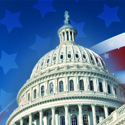National
Polling unreliable on marriage initiatives: report
Study shows campaigns do little to move voters

A new report is shedding light on the effectiveness of statewide campaigns against same-sex marriage, although the findings are raising additional questions.
The report — which examines the trend of public opinion on same-sex marriage in 33 states that have had the issue on the ballot — found efforts during campaign periods had very little impact on moving voters to oppose same-sex marriage bans on Election Day.
Additionally, the report found polling data gathered during campaigns on marriage initiatives is misleading because a greater percentage of people vote in favor of same-sex marriage bans than the percentage who tell pollsters they will support the ban.
Patrick Egan, author of the report and a gay political science professor at New York University, made the findings public Tuesday.
He said that he had limited explanations for what caused this behavior among voters. But at a press event in San Francisco, Egan explained that his report dismisses a number of theories popularly used to explain why polling data for marriage ballot questions doesn’t accurately reflect election results.
One theory that Egan advances in his report — but says he finds no evidence to support — is the idea that responders are lying to pollsters when they say they’ll vote against a same-sex marriage ban so that they seem more tolerant.
Such a phenomenon would be similar to the “Bradley effect,” a theory that polling participants would lie to pollsters by saying they’ll vote for a non-white person in an election and instead vote for a white candidate at the polls.
Egan dismissed this theory with regard to marriage initiatives after looking at several contexts in which voters may feel more social pressure to vote in opposition to bans on same-sex marriage, such as in states with a greater population of openly gay, lesbian and bisexual people, or polls conducted by live interviewers as opposed to automated pollsters.
In all these contexts, Egan said he could find “no discrepancy” in voters being more truthful about what they’re telling pollsters in certain states or in certain situations.
“All of the findings here just show that voters do not appear to be lying to public opinion pollsters when they are asked about their support for same-sex marriage bans,” Egan said.
Another theory that Egan refutes with regard to the discrepancy between polls and election results is that voters are confused about what a “yes” vote and a “no” vote entails on an initiative. Egan said this theory doesn’t hold up because polling information is as unreliable at the start of the campaign — before voters have been educated on the subject — as it is closer to Election Day.
“The gap does not become smaller over the course of the campaigns, so polls are just as accurate on the night before Election Day as they are six months out — just as inaccurate, I should say,” he said.
Egan said this theory is shown to be invalid when comparing polling data and election results from states with more educated voters to states with less educated voters.
“Even in states where voters are informed — that is, we know from other data that state residents tend to be more interested, engaged and informed about politics — we are not seeing that gap become any smaller than in states where voters don’t pay too much attention to politics at all,” Egan said.
In an attempt to determine why polling data on the marriage issue is unreliable, Egan said his answer as a political scientist is “more research is needed,” but also speculated it may relate to how pollsters determine likely voters.
Noting that most of the surveys in his report are of likely voters, Egan said pollsters could be screening out people who would vote for same-sex marriage bans on Election Day.
“That would help explain the difference we see between polling and election results, and why it’s so consistent over time,” he said.
A number of LGBT civil rights leaders at the San Francisco press conference said they intend to use the report to guide strategy for future ballot initiatives on marriage. Activists in California, where Proposition 8 ended gay nuptials in 2008, are looking to bring the issue of same-sex marriage back to the ballot to reverse the initiative in 2012.
Geoff Kors, executive director of Equality California, said the findings show voters are “at their least persuadable” during the course of a campaign.
“But when we look over the last decade at the amazing movement we’ve seen on what is one of the most challenging social issues to move people on, we’ve seen that the movement happens not during the campaign, but away from the campaign,” Kors said.
He noted that California in 2000 passed Prop 22, a statutory ban on same-sex marriage by 23 points, and in 2008 passed Prop 8, the constitutional ban, by four points.
“All that movement happened not in the couple months before Prop 8, but in the years between those elections,” he said.
Kors said the process is continuing in California with recent public polls showing a 50 percent or majority support for same-sex marriage.
Kate Kendell, executive director for the National Center for Lesbian Rights, also said the study demonstrates efforts to change the hearts and minds of voters must be made before a campaign begins.
“In the midst of a campaign, voters are perhaps least likely to have their views changed — particularly on an issue like marriage, an issue they feel like they understand and know,” she said.
Kendell said “it’s absolutely clear” in the fight for same-sex marriage that conversations “need to happen now about who we are, our lives, our families, our children, our hopes and dreams.”
National
Same-sex couples vulnerable to adverse effects of climate change
Williams Institute report based on Census, federal agencies

A new report by the Williams Institute at the UCLA School of Law finds that same-sex couples are at greater risk of experiencing the adverse effects of climate change compared to different-sex couples.
LGBTQ people in same-sex couple households disproportionately live in coastal areas and cities and areas with poorer infrastructure and less access to resources, making them more vulnerable to climate hazards.
Using U.S. Census data and climate risk assessment data from NASA and the Federal Emergency Management Agency, researchers conducted a geographic analysis to assess the climate risk impacting same-sex couples. NASA’s risk assessment focuses on changes to meteorological patterns, infrastructure and built environment, and the presence of at-risk populations. FEMA’s assessment focuses on changes in the occurrence of severe weather events, accounting for at-risk populations, the availability of services, and access to resources.
Results show counties with a higher proportion of same-sex couples are, on average, at increased risk from environmental, infrastructure, and social vulnerabilities due to climate change.
“Given the disparate impact of climate change on LGBTQ populations, climate change policies, including disaster preparedness, response, and recovery plans, must address the specific needs and vulnerabilities facing LGBTQ people,” said study co-author Ari Shaw, senior fellow and director of international programs at the Williams Institute. “Policies should focus on mitigating discriminatory housing and urban development practices, making shelters safe spaces for LGBT people, and ensuring that relief aid reaches displaced LGBTQ individuals and families.”
“Factors underlying the geographic vulnerability are crucial to understanding why same-sex couples are threatened by climate change and whether the findings in our study apply to the broader LGBTQ population,” said study co-author Lindsay Mahowald, research data analyst at the Williams Institute. “More research is needed to examine how disparities in housing, employment, and health care among LGBT people compound the geographic vulnerabilities to climate change.”
Read the report
Federal Government
Lambda Legal praises Biden-Harris administration’s finalized Title IX regulations
New rules to take effect Aug. 1

The Biden-Harris administration’s revised Title IX policy “protects LGBTQ+ students from discrimination and other abuse,” Lambda Legal said in a statement praising the U.S. Department of Education’s issuance of the final rule on Friday.
Slated to take effect on Aug. 1, the new regulations constitute an expansion of the 1972 Title IX civil rights law, which prohibits sex-based discrimination in education programs that receive federal funding.
Pursuant to the U.S. Supreme Court’s ruling in the landmark 2020 Bostock v. Clayton County case, the department’s revised policy clarifies that discrimination on the basis of sexual orientation and gender identity constitutes sex-based discrimination as defined under the law.
“These regulations make it crystal clear that everyone can access schools that are safe, welcoming and that respect their rights,” Education Secretary Miguel Cardona said during a call with reporters on Thursday.
While the new rule does not provide guidance on whether schools must allow transgender students to play on sports teams corresponding with their gender identity to comply with Title IX, the question is addressed in a separate rule proposed by the agency in April.
The administration’s new policy also reverses some Trump-era Title IX rules governing how schools must respond to reports of sexual harassment and sexual assault, which were widely seen as imbalanced in favor of the accused.
Jennifer Klein, the director of the White House Gender Policy Council, said during Thursday’s call that the department sought to strike a balance with respect to these issues, “reaffirming our longstanding commitment to fundamental fairness.”
“We applaud the Biden administration’s action to rescind the legally unsound, cruel, and dangerous sexual harassment and assault rule of the previous administration,” Lambda Legal Nonbinary and Transgender Rights Project Director Sasha Buchert said in the group’s statement on Friday.
“Today’s rule instead appropriately underscores that Title IX’s civil rights protections clearly cover LGBTQ+ students, as well as survivors and pregnant and parenting students across race and gender identity,” she said. “Schools must be places where students can learn and thrive free of harassment, discrimination, and other abuse.”
Michigan
Mich. Democrats spar over LGBTQ-inclusive hate crimes law
Lawmakers disagree on just what kind of statute to pass

Michigan could soon become the latest state to pass an LGBTQ-inclusive hate crime law, but the state’s Democratic lawmakers disagree on just what kind of law they should pass.
Currently, Michigan’s Ethnic Intimidation Act only offers limited protections to victims of crime motivated by their “race, color, religion, gender, or national origin.” Bills proposed by Democratic lawmakers expand the list to include “actual or perceived race, color, religion, gender, sexual orientation, gender identity or expression, ethnicity, physical or mental disability, age, national origin, or association or affiliation with any such individuals.”
Democratic Gov. Gretchen Whitmer and Attorney General Dana Nessel have both advocated for a hate crime law, but house and senate Democrats have each passed different hate crimes packages, and Nessel has blasted both as being too weak.
Under the house proposal that passed last year (House Bill 4474), a first offense would be punishable with a $2,000 fine, up to two years in prison, or both. Penalties double for a second offense, and if a gun or other dangerous weapons is involved, the maximum penalty is six years in prison and a fine of $7,500.
But that proposal stalled when it reached the senate, after far-right news outlets and Fox News reported misinformation that the bill only protected LGBTQ people and would make misgendering a trans person a crime. State Rep. Noah Arbit, the bill’s sponsor, was also made the subject of a recall effort, which ultimately failed.
Arbit submitted a new version of the bill (House Bill 5288) that added sections clarifying that misgendering a person, “intentionally or unintentionally” is not a hate crime, although the latest version (House Bill 5400) of the bill omits this language.
That bill has since stalled in a house committee, in part because the Democrats lost their house majority last November, when two Democratic representatives resigned after being elected mayors. The Democrats regained their house majority last night by winning two special elections.
Meanwhile, the senate passed a different package of hate crime bills sponsored by state Sen. Sylvia Santana (Senate Bill 600) in March that includes much lighter sentences, as well as a clause ensuring that misgendering a person is not a hate crime.
Under the senate bill, if the first offense is only a threat, it would be a misdemeanor punishable by one year in prison and up to $1,000 fine. A subsequent offense or first violent hate crime, including stalking, would be a felony that attracts double the punishment.
Multiple calls and emails from the Washington Blade to both Arbit and Santana requesting comment on the bills for this story went unanswered.
The attorney general’s office sent a statement to the Blade supporting stronger hate crime legislation.
“As a career prosecutor, [Nessel] has seen firsthand how the state’s weak Ethnic Intimidation Act (not updated since the late 1980’s) does not allow for meaningful law enforcement and court intervention before threats become violent and deadly, nor does it consider significant bases for bias. It is our hope that the legislature will pass robust, much-needed updates to this statute,” the statement says.
But Nessel, who has herself been the victim of racially motivated threats, has also blasted all of the bills presented by Democrats as not going far enough.
“Two years is nothing … Why not just give them a parking ticket?” Nessel told Bridge Michigan.
Nessel blames a bizarre alliance far-right and far-left forces that have doomed tougher laws.
“You have this confluence of forces on the far right … this insistence that the First Amendment protects this language, or that the Second Amendment protects the ability to possess firearms under almost any and all circumstances,” Nessel said. “But then you also have the far left that argues basically no one should go to jail or prison for any offense ever.”
The legislature did manage to pass an “institutional desecration” law last year that penalizes hate-motivated vandalism to churches, schools, museums, and community centers, and is LGBTQ-inclusive.
According to data from the U.S. Department of Justice, reported hate crime incidents have been skyrocketing, with attacks motivated by sexual orientation surging by 70 percent from 2020 to 2022, the last year for which data is available.
Twenty-two states, D.C., Puerto Rico, and the U.S. Virgin Islands have passed LGBTQ-inclusive hate crime laws. Another 11 states have hate crime laws that include protections for “sexual orientation” but not “gender identity.”
Michigan Democrats have advanced several key LGBTQ rights priorities since they took unified control of the legislature in 2023. A long-stalled comprehensive anti-discrimination law was passed last year, as did a conversion therapy ban. Last month the legislature updated family law to make surrogacy easier for all couples, including same-sex couples.
A bill to ban the “gay panic” defense has passed the state house and was due for a Senate committee hearing on Wednesday.
-

 District of Columbia5 days ago
District of Columbia5 days agoNew D.C. LGBTQ+ bar Crush set to open April 19
-

 District of Columbia5 days ago
District of Columbia5 days agoReenactment of first gay rights picket at White House draws interest of tourists
-

 South America3 days ago
South America3 days agoDaniel Zamudio murderer’s parole request denied
-

 Opinions5 days ago
Opinions5 days agoOpen or closed? No, not your bar tab












